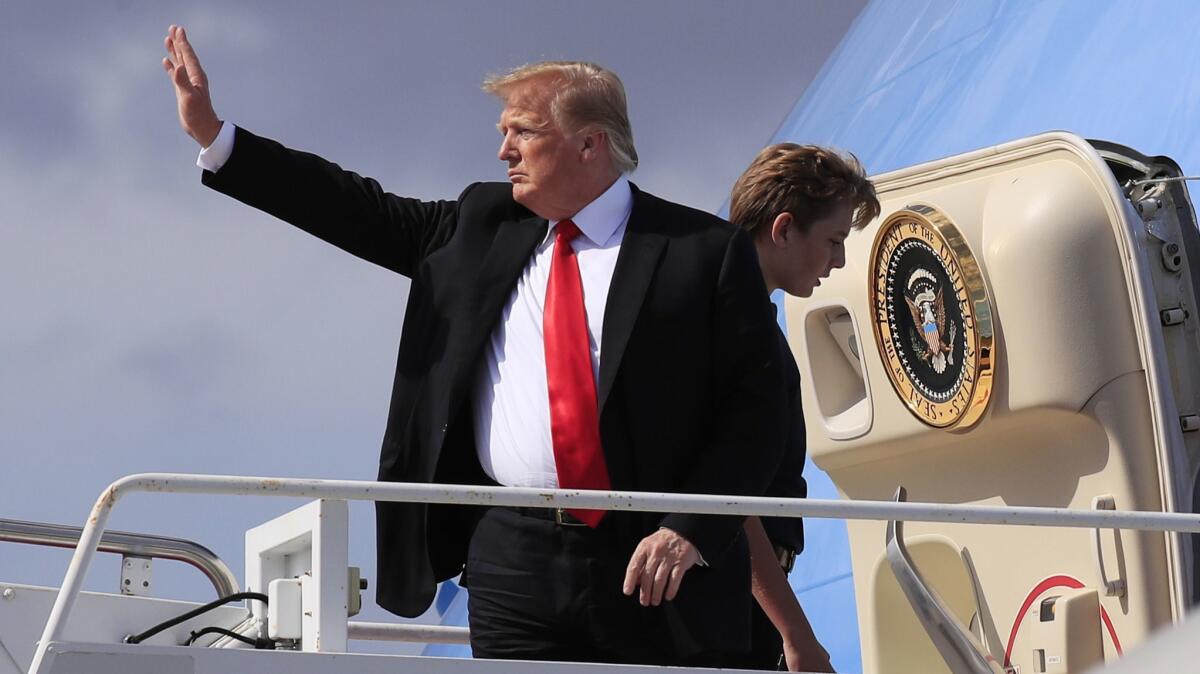Opinion: Trump has no interest in addressing border issues or immigration reform

- Share via
The Trump administration is right about one thing: The U.S. immigration system is broken, and the surge of desperate migrant families from Central America arriving at the U.S.-Mexico border threatens to overwhelm the resources the government has deployed there.
But President Trump’s inane responses not only won’t solve the problems, they will in all likelihood make them worse. Some of the policies — such as forcing asylum seekers to wait in often squalid conditions in Mexico while their claims proceed — are inhumane and probably illegal.
And if Trump follows through this week with one of his favorite threats — closing the border if Mexico doesn’t stop the human tide — he would cause significant economic damage to the U.S. About $1.5 billion in goods, much of it crucial to supply chains for American manufacturers, crosses the border daily, as do an estimated 1 million people.
The president argues that a spike in the number of families seeking asylum at the border has created a national emergency. It hasn’t. In fact, the number of migrants apprehended at the border in recent months has increased over the last couple of years, but remains a fraction of the 1.5 million a year during the Clinton administration.
This is an administrative and management failure.
Then, the majority of people caught entering the country without permission were young Mexican men seeking work. Increasingly, those apprehended now are families or unaccompanied minors seeking asylum, and they pose a very different challenge. Most are fleeing violence and poverty in their home countries, and addressing those so-called push factors is crucial to reducing the number of people hitting the road.
Yet the president has ordered a freeze on more than $500 million in humanitarian aid to El Salvador, Honduras and Guatemala because those governments, he says, have failed to keep migrants from leaving.
But the freeze doesn’t punish those governments. That aid money primarily goes to nonprofit organizations working to combat violence, create jobs and stabilize communities so that fewer people feel compelled to leave. Shutting off the aid will worsen the problem the president complains about.
Further, under U.S. law and international agreements, people have a right to seek asylum by presenting themselves at the border and filing a claim. What the Trump administration has been unable to do is marshal the necessary resources to handle the requests. Is this a border crisis? No. This is an administrative and management failure.
Enter the Fray: First takes on the news of the minute »
To its credit, the Department of Homeland Security announced Monday that it would speed up temporary reassignment of agents to the border to help out, but the bigger problem remains unaddressed — expanding the capacity of the immigration court system to more quickly process asylum requests without compromising due process.
The administration doesn’t seem to have a real desire to fix immigration. If it did, it would be working with Congress on comprehensive reform.
Instead, it has radically reduced the number of refugees it will accept for resettlement. It has, according to the American Immigration Lawyers Assn., radically slowed the processing of immigration applications and other forms.
And it is forcing more and more asylum seekers to wait out the often years-long process in Mexico, a policy that does not seem to have any basis in U.S. law – yet another example of this administration just forging ahead to see what it can get away with.
This is one of the most anti-immigrant administrations in recent memory. The president’s policy goal is to allow fewer people into the country and eject as many people here without permission as his agents can round up, oblivious to the damage that causes to families, communities and local economies.
More to Read
A cure for the common opinion
Get thought-provoking perspectives with our weekly newsletter.
You may occasionally receive promotional content from the Los Angeles Times.










